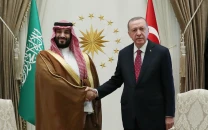Tale of Egypt’s ‘revolution’
Egypt stands deeply divided on Islamist & secular lines, with military the principal political broker, decision-maker.

The writer is a former foreign secretary of Pakistan
From Tunis to Morocco, Egypt, Libya, Syria and Yemen, young people came out on the streets, protesting against generations of oppression. Anti-government sentiment, long brewing in Egypt, soon erupted into an inflamed mass movement, with millions of Egyptians on the streets chanting the most famous line of Tunisian poetry: “When the people decide to live their own lives, destiny will obey and chains will be broken.” Cairo’s Tahrir Square became the dumping ground of another Arab dictatorship. The Egyptian people, it seemed, had chosen to live their own lives. Destiny obeyed them. Indeed, their chains were broken. Within days, they ousted their octogenarian dictator Hosni Mubarak, who had remained Egypt’s unchallenged ruler for over 30 years. They opted to choose their next president by ballot, not bullet. In June 2012, they elected Muslim Brotherhood’s Mohamed Morsi as their president. But even after this revolutionary development, Egypt never had a smooth political transition and remained locked in an uneasy fractious mode. Morsi inherited a dysfunctional, corrupt state, failing to deal with multiplying crises.
The Muslim Brotherhood, once respected as the most potent opposition to Mubarak’s police state, had never governed before. It failed to deliver what the people expected of it after decades of repression and corruption by military-led elitist classes. With the economy on the verge of collapse, the state was falling apart. Morsi’s opponents accused him of becoming increasingly authoritarian. He accused remnants of the Mubarak administration, including the military, business elite and judiciary officials of sabotaging his government.
Egypt’s military had dominated the country for over six decades and remained in direct power for a year and a half after Mubarak’s ouster in 2011. Even after Morsi’s election, the military never gave up its preponderant role. In his crucial initial days, Morsi tried to placate the army by granting it autonomy in the new constitution and promised not to interfere with the parallel business empire it had created for itself. In perhaps, the most brazen move of his tenure, Morsi, with the help of younger officers, purged the military of top commanders loyal to Mubarak, including Field Marshal Mohamed Hussein Tantawi. The move gave the leader a narrow space to negotiate a new relationship with the military’s younger officers, notably Morsi’s handpicked chief of staff, General (now Field Marshal) Abdel Fattah alSisi. But within a year, the military grew restless as anti-government protests spread, further threatening the economy. The military gave Morsi an ultimatum to order reforms and resolve the crisis. Morsi rejected the ultimatum. On July 3, 2013, the military ousted him in what most Egyptians hailed as the second revolution in two years. Morsi’s supporters decried it as a military coup, cleverly wrapped up as a popularly-supported democratic act.
Whatever it was, Tahrir Square, this time, witnessed the masses devouring their own revolution. Tens of thousands of people jubilated over the military’s action in removing a president they had democratically elected only a year ago. Their grievances ranged from concerns about the Muslim Brotherhood’s Islamic agenda being brought to bear on the nation’s laws, to frustration with the Morsi government’s failures in addressing serious issues of economy, energy, unemployment, inflation, and the worsening law and order situation. They welcomed the change as a move that they believed would correct the path of the revolution that drove Mubarak from office in February 2011.
In their misplaced euphoria, Egyptians did not realise that their country was back to square one. The nation stood torn apart with a violent standoff threatening to further destabilise the country. Islamist forces condemned Morsi’s removal as illegal. Secular parties, on the other hand, supported the military in the hope for a quick transition back to civilian rule, but they were also divided on how to move forward towards democratic rule. Meanwhile, the revolutionary youth groups — which had spearheaded the pro-democracy protests since 2011 — worried that the generals might use their power to protect the old order and quash the gains of the 2011 uprising.
Their apprehensions were not entirely baseless. Field Marshal alSisi, under his own authority, not only suspended the constitution but also appointed the head of the country’s supreme constitutional court, Adly Mansour, as Egypt’s interim president with powers to issue constitutional decrees. He also announced a road map for ‘early’ presidential elections after an interim period, during which the constitution was to be amended through a referendum. It looked so similar to our own history under successive military dictators, who randomly trampled our Constitution, leaving very little of the original text intact.
Egypt’s constitution, in its amended form, is a different constitution altogether. It gives the interim president sweeping powers that are needed for a choreographed political transition. In a surprise move earlier this week, the caretaker government, headed by Hazem alBeblawi, resigned en masse, apparently paving the way for Field Marshal alSisi, who was deputy prime minister and defence minister in that cabinet, to declare his candidature for presidency. Though he hasn’t made any announcement yet, he is widely expected to run for president in the election due in April.
A new prime minister has been named to head the sixth government after Mubarak’s ouster. The country stands deeply divided on Islamist and secular lines, with its military remaining the principal political broker and decision-maker. One hopes the Egyptians now understand what they have done to themselves. Egypt is back to square one, with the military once again becoming the sole arbiter of its political future. This is the pathetic tale of Egypt’s 2011 revolution.
But let there be no comparisons with Pakistan, where despite protracted spells of military rule and systemic aberrations, we now have a much stronger democratic tradition, reinforced not only by periodical elections, but also by our military’s firm resolve to remain committed to strict adherence to its constitutional role.
Published in The Express Tribune, March 1st, 2014.
Like Opinion & Editorial on Facebook, follow @ETOpEd on Twitter to receive all updates on all our daily pieces.



















COMMENTS
Comments are moderated and generally will be posted if they are on-topic and not abusive.
For more information, please see our Comments FAQ